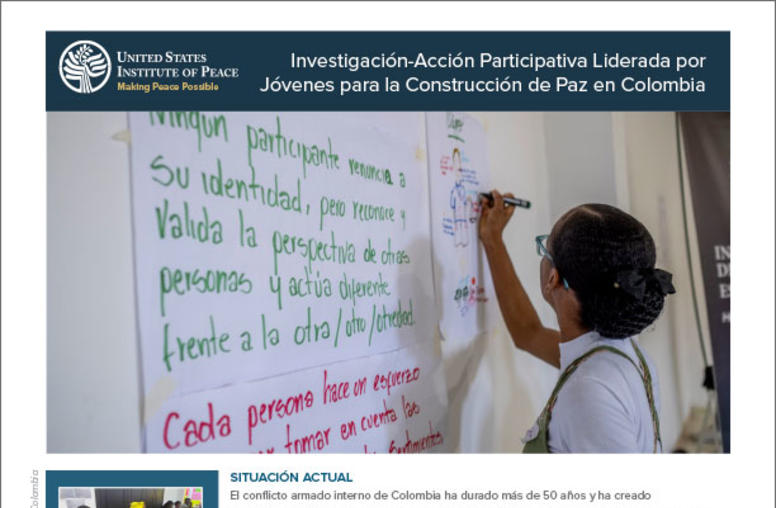Peacebuilding in Dangerous Places: The Work of Civil Society in Conflict Zones
This event features four USIP grantees from Afghanistan, Iraq, Colombia and Sudan who are intimately familiar with the on-the-ground realities in their countries. The grantees discuss implementing peacebuilding projects in difficult and dangerous environments. Washington planners will be able to hear first hand what on-the-ground practitioners are doing to stay safe while getting important work done.
Event Summary
In conflict zones around the world, how can people work to promote peace and stability despite the very real risks on the ground?
Four practitioners who received grants from the United States Institute of Peace recently discussed how they are able to implement peacebuilding projects in difficult and dangerous environments, such as Sudan, Afghanistan, Iraq and Colombia.
In addition to addressing the unique challenges they face day to day, the grantees also spoke of the opportunities and successes in their countries of origin.
Andrew Blum, USIP’s program officer and moderator of the discussion, said , “We think it's very important to provide the opportunity to our grantees, who are working on difficult peacebuilding issues, to speak directly to a Washington audience on the key challenges that are facing civil society in their countries.”
The Institute, through its Grants and Fellowships program, has invested more than $58 million in more than 1,700 peacebuilding projects in 76 countries. The program supports individuals, universities, nonprofit and civil society groups through their work on innovative projects, involving academic and applied research and the development of practitioner resources.
After opening remarks from USIP President Richard H. Solomon, each grantee spoke about their work at the September 14, 2010 public event titled “Peacebuilding in Dangerous Places: The Work of Civil Society in Conflict Zones.”
In Sudan, USIP grantee Abdel-Mitaal Girshab from the Institute for the Development of Civil Society works throughout Africa's largest country to increase the knowledge of democracy among youth and women. Using workshops focused on youth leadership, citizenship, dialogue negotiation, interactive approaches and confliction resolution, his group hopes to build the youth recognition among elders. These at-risk groups have been marginalized and represent a generation that has never known democracy.
Girshab, who has many challenges in his diverse homeland that has faced decades of internal wars, noted what he found helpful for working in a dangerous area: Be transparent, inclusive and nonpartisan.
He urged others to get rid of stereotypes and establish ground rules when working with multicultural and multiple tribes. “We all have to work together.”
He has used drama and music to educate people about elections, Sudan’s looming referendum scheduled for January 2011, and more generally about what healthy democratic participation looks like.
Masood Karokhail, deputy director of the Tribal Liaison Office in Afghanistan, summarized how his office gets work done in Kabul. “We have 237 people in over nine provinces,” said Karokhail.
“These non-government and civil society groups are soft targets. So we often ask our staff to assess the security situation. The regional powers have an impact on the security situation in Afghanistan so it’s important for the provincial leaders to work with community leaders. We can hold our training in another province if it is not safe. Right now the most action is along the Afghanistan/Pakistan border,“ he said.
Most Afghans are Sunni Muslims, and usually speak Persian (Dari) and Pashto. In September 2009, USIP opened a permanent office in the capital of Kabul to further expand the scope of its work in Afghanistan.
Aari Mohammed from INSAN Iraqi Society spoke about conducting grassroots workshops to develop a sense of coexistence among Iraq’s various ethnic, religious and tribal communities. Nongovernmental organizations (NGOs) have to build a bridge between the grassroots and government, he noted. His group is working on creating a “spider web” of communications between the community and government. They are training NGOs on conflict resolution and peacebuilding. Another project in the works focuses on eliminating media bias through programs that help them become more conflict sensitive.
He praised USIP’s grantee program because it allows the group to develop its own programs. Iraq, which is the size of California, has a population of 31 million of mostly Shia Muslims who speak Arabic and Kurdish. He gave advice to others who work in conflict zones. "Be open. Share information with other groups. Don’t belong to any political parties and be independent.”
Maria Emma Wills, of the Historical Memory Commission, urged the audience not to forget that Colombia is still at war. Colombia is 1/9 the size of the U.S. with a diverse population and geography that is united by the Spanish language and Catholic faith.
Wills’ work uses narratives to bring attention to and build empathy toward war victims mostly women, children, ethnic groups. These victims' pain and suffering have not been chronicled. By reconstructing the massacres, the public has to face the horror of war through the group’s media briefings, reports, documentaries, photo exhibits theater and the arts. Her group has stayed out of danger by listening to locals and being discreet.
By the end of the discussion, the grantees and audience came away with a better understanding of the real challenges peacebuilders face in their home countries, and how the international community can better assist them in meeting their goals to end the country’s conflict.
This event featured the following speakers:
- Richard H. Solomon, Opening Remarks
President, United States Institute of Peace - Abdel-Mitaal Girshab
Institute for the Development of Civil Society, Sudan - Masood Karokhail
Tribal Liaison Office, Afghanistan - Aari Mohammed
INSAN Iraqi Society, Iraq - Maria Emma Wills
Historical Memory Commission, Colombia - Andrew Blum, Moderator
United States Institute of Peace, Grant Program


